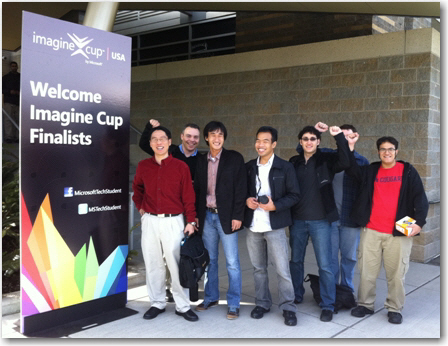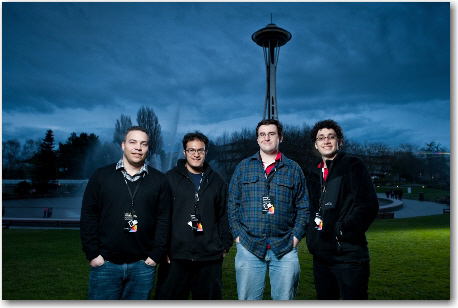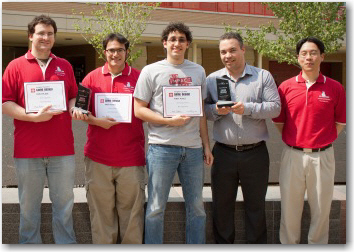Tackling deforestation, water pollution and poverty earned University of Houston (UH)
students top honors in computer game designing at the U.S. finals of the 2011 Microsoft
Imagine Cup competition. With the annual contest drawing more than 74,000 of the nation’s
brightest technology students to Microsoft’s headquarters, UH made quite an impact
with three of its four finalists winning in game design. 
Team Big Impact Bear won first place and $6,000 in the mobile game design category with its project “Forest Gun” that aims to prevent and reverse deforestation in the world. Team AAMP took second place and $3,000 in the same category with “Operation Clean Sweep,” a project intended to raise awareness of water pollution. Both teams chose to address environmental sustainability issues and have earned the opportunity to submit their projects for the worldwide finals to be held in July.
A third team, Righteous Noodle, secured third place and $2,000 in a project called “Eva Frontier” in the Windows/Xbox game design category, developing a game that challenges players to end poverty through the use of advanced technologies. The first-place winners were mentored by UH game developing instructor Jose Baez, with the other two teams guides by research assistant professor Chang Yun. Each of the 14 finalists making up the teams from UH also won a Windows Phone 7.
“This success showcases not only UH’s gaming coursework, but also the excellent overall quality of our undergraduate program,” said Jaspal Subhlok, professor and chair of the computer science department. “Developing computer games requires expertise in diverse facets of computing, as well as creativity and artistic skills, which are the same challenges students will face in their computing careers. These victories reinforce the fact that computer science students at UH receive an excellent education and have the skills and training to outperform anybody.”
UH has offered computer science students courses in interactive game development and graphics since 2007, and its computer science department was among the first in the nation to offer gaming curriculum courses. Currently consisting of four courses, plans are under way to offer a master’s degree in computer science with a concentration on game development in the near future.
 As a testament to the success of UH’s program, Yun was invited to present at the second
annual Game On! Texas Symposium held in Austin the day after the Imagine Cup winners
were announced in Redmond, Wash. Put on by the Texas Film Commission, the event was
designed to bring together leaders from the video gaming industry with members of
the education and business communities to improve Texas’ digital media and video game
education programs. With the third highest concentration of video game development
companies in the United States, Texas is home to more than 120 of these companies
that spend nearly $235 million in the state annually.
As a testament to the success of UH’s program, Yun was invited to present at the second
annual Game On! Texas Symposium held in Austin the day after the Imagine Cup winners
were announced in Redmond, Wash. Put on by the Texas Film Commission, the event was
designed to bring together leaders from the video gaming industry with members of
the education and business communities to improve Texas’ digital media and video game
education programs. With the third highest concentration of video game development
companies in the United States, Texas is home to more than 120 of these companies
that spend nearly $235 million in the state annually.
Notable influencers providing keynotes at this year’s conference were Texas Attorney General Greg Abbott, former Supreme Court Justice Sandra Day O’Conner, Disney game designer Warren Spector and State Rep. Mark Strama. Yun was among a handful of esteemed speakers from Texas’ major post-secondary programs and had the opportunity to attend sessions that explored video-game curriculum and its future in developing the diverse workforce of the future.
Presenting an overview of UH’s gaming program, how it fits into higher education and recapping the successes of the three-team sweep at the Imagine Cup competition, Yun also spoke about the potential of the serious games industry. Among its goals, serious games are being used to forge links between the electronic game industry and projects involving the use of games in education, training, health and public policy, with the intent of organizing and accelerating the adoption of computer games for a variety of challenges facing the world. At the conference, Yun learned that serious games are expected to generate trillions of dollars in the coming decades.
“UH is definitely on the right track with so many of our students reaching the national finals of Imagine Cup this year,” Yun said. “This is a testament to the sophistication of our computer science department’s curriculum and reflects how the number and quality of students in the program has increased dramatically over the past few years.”
 Francisco Jimenez, one of the budding software engineering designers from Team Big
Impact Bear, says he never imagined a potential future as a game developer when coming
to study at UH, but is now excited at the prospect of possibly getting a chance to
work in the gaming industry. As first-place winners, Jimenez, Daniel Salazar and Brett
Langsjoen will be given an opportunity to interview for an internship with Microsoft.
Francisco Jimenez, one of the budding software engineering designers from Team Big
Impact Bear, says he never imagined a potential future as a game developer when coming
to study at UH, but is now excited at the prospect of possibly getting a chance to
work in the gaming industry. As first-place winners, Jimenez, Daniel Salazar and Brett
Langsjoen will be given an opportunity to interview for an internship with Microsoft.
The other students attending the event from UH were second- and third-place winners Patipol Paripoonnanonda, Mark Rojas and Antonio Farias from Team AAMP and Jack Chaiyakhom, Son Tran, Kyuho Shim and Thien Pham from Team Righteous Noodle. While Melissa Dickinson, Phil Trevino, William Holtkamp and Carlos Lacayo from Team STC did not place, they were afforded the opportunity to network and present their entry “Deep Sea,” which is a game that promotes ways to defend an oil rig when faced with inclement weather and explosions in an effort to protect the ocean environment.
Editor’s Note: High-resolution photos of the students and their professors at the event and with their awards are available to media by contacting Lisa Merkl.
About the University of Houston
The University of Houston is a comprehensive national research institution serving the globally competitive Houston and Gulf Coast Region by providing world-class faculty, experiential learning and strategic industry partnerships. UH serves more than 38,500 students in the nation’s fourth-largest city, located in the most ethnically and culturally diverse region of the country.
About the College of Natural Sciences and Mathematics
The UH College of Natural Sciences and Mathematics, with 181 ranked faculty and approximately 4,500 students, offers bachelor’s, master’s and doctoral degrees in the natural sciences, computational sciences and mathematics. Faculty members in the departments of biology and biochemistry, chemistry, computer science, earth and atmospheric sciences, mathematics and physics conduct internationally recognized research in collaboration with industry, Texas Medical Center institutions, NASA and others worldwide.
For more information about UH, visit the university’s Newsroom.
To receive UH science news via e-mail, sign up for UH-SciNews.
For additional news alerts about UH, follow us on Facebook and Twitter.

Team Big Impact Bear won first place and $6,000 in the mobile game design category with its project “Forest Gun” that aims to prevent and reverse deforestation in the world. Team AAMP took second place and $3,000 in the same category with “Operation Clean Sweep,” a project intended to raise awareness of water pollution. Both teams chose to address environmental sustainability issues and have earned the opportunity to submit their projects for the worldwide finals to be held in July.
A third team, Righteous Noodle, secured third place and $2,000 in a project called “Eva Frontier” in the Windows/Xbox game design category, developing a game that challenges players to end poverty through the use of advanced technologies. The first-place winners were mentored by UH game developing instructor Jose Baez, with the other two teams guides by research assistant professor Chang Yun. Each of the 14 finalists making up the teams from UH also won a Windows Phone 7.
“This success showcases not only UH’s gaming coursework, but also the excellent overall quality of our undergraduate program,” said Jaspal Subhlok, professor and chair of the computer science department. “Developing computer games requires expertise in diverse facets of computing, as well as creativity and artistic skills, which are the same challenges students will face in their computing careers. These victories reinforce the fact that computer science students at UH receive an excellent education and have the skills and training to outperform anybody.”
UH has offered computer science students courses in interactive game development and graphics since 2007, and its computer science department was among the first in the nation to offer gaming curriculum courses. Currently consisting of four courses, plans are under way to offer a master’s degree in computer science with a concentration on game development in the near future.
 As a testament to the success of UH’s program, Yun was invited to present at the second
annual Game On! Texas Symposium held in Austin the day after the Imagine Cup winners
were announced in Redmond, Wash. Put on by the Texas Film Commission, the event was
designed to bring together leaders from the video gaming industry with members of
the education and business communities to improve Texas’ digital media and video game
education programs. With the third highest concentration of video game development
companies in the United States, Texas is home to more than 120 of these companies
that spend nearly $235 million in the state annually.
As a testament to the success of UH’s program, Yun was invited to present at the second
annual Game On! Texas Symposium held in Austin the day after the Imagine Cup winners
were announced in Redmond, Wash. Put on by the Texas Film Commission, the event was
designed to bring together leaders from the video gaming industry with members of
the education and business communities to improve Texas’ digital media and video game
education programs. With the third highest concentration of video game development
companies in the United States, Texas is home to more than 120 of these companies
that spend nearly $235 million in the state annually. Notable influencers providing keynotes at this year’s conference were Texas Attorney General Greg Abbott, former Supreme Court Justice Sandra Day O’Conner, Disney game designer Warren Spector and State Rep. Mark Strama. Yun was among a handful of esteemed speakers from Texas’ major post-secondary programs and had the opportunity to attend sessions that explored video-game curriculum and its future in developing the diverse workforce of the future.
Presenting an overview of UH’s gaming program, how it fits into higher education and recapping the successes of the three-team sweep at the Imagine Cup competition, Yun also spoke about the potential of the serious games industry. Among its goals, serious games are being used to forge links between the electronic game industry and projects involving the use of games in education, training, health and public policy, with the intent of organizing and accelerating the adoption of computer games for a variety of challenges facing the world. At the conference, Yun learned that serious games are expected to generate trillions of dollars in the coming decades.
“UH is definitely on the right track with so many of our students reaching the national finals of Imagine Cup this year,” Yun said. “This is a testament to the sophistication of our computer science department’s curriculum and reflects how the number and quality of students in the program has increased dramatically over the past few years.”
 Francisco Jimenez, one of the budding software engineering designers from Team Big
Impact Bear, says he never imagined a potential future as a game developer when coming
to study at UH, but is now excited at the prospect of possibly getting a chance to
work in the gaming industry. As first-place winners, Jimenez, Daniel Salazar and Brett
Langsjoen will be given an opportunity to interview for an internship with Microsoft.
Francisco Jimenez, one of the budding software engineering designers from Team Big
Impact Bear, says he never imagined a potential future as a game developer when coming
to study at UH, but is now excited at the prospect of possibly getting a chance to
work in the gaming industry. As first-place winners, Jimenez, Daniel Salazar and Brett
Langsjoen will be given an opportunity to interview for an internship with Microsoft.
The other students attending the event from UH were second- and third-place winners Patipol Paripoonnanonda, Mark Rojas and Antonio Farias from Team AAMP and Jack Chaiyakhom, Son Tran, Kyuho Shim and Thien Pham from Team Righteous Noodle. While Melissa Dickinson, Phil Trevino, William Holtkamp and Carlos Lacayo from Team STC did not place, they were afforded the opportunity to network and present their entry “Deep Sea,” which is a game that promotes ways to defend an oil rig when faced with inclement weather and explosions in an effort to protect the ocean environment.
###
Editor’s Note: High-resolution photos of the students and their professors at the event and with their awards are available to media by contacting Lisa Merkl.
About the University of Houston
The University of Houston is a comprehensive national research institution serving the globally competitive Houston and Gulf Coast Region by providing world-class faculty, experiential learning and strategic industry partnerships. UH serves more than 38,500 students in the nation’s fourth-largest city, located in the most ethnically and culturally diverse region of the country.
About the College of Natural Sciences and Mathematics
The UH College of Natural Sciences and Mathematics, with 181 ranked faculty and approximately 4,500 students, offers bachelor’s, master’s and doctoral degrees in the natural sciences, computational sciences and mathematics. Faculty members in the departments of biology and biochemistry, chemistry, computer science, earth and atmospheric sciences, mathematics and physics conduct internationally recognized research in collaboration with industry, Texas Medical Center institutions, NASA and others worldwide.
For more information about UH, visit the university’s Newsroom.
To receive UH science news via e-mail, sign up for UH-SciNews.
For additional news alerts about UH, follow us on Facebook and Twitter.